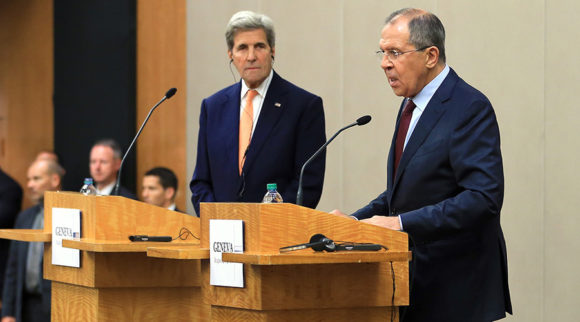
BY OWN CORRESPONDENT
Syrian media reported that on November 24 militants shelled residential districts of Aleppo with chlorine gas.
Syrian government forces responded by pounding their positions, causing significant losses.
Militants based north of Aleppo fired chlorine-loaded shells at the city’s neighbourhoods, causing at least 107 people to be delivered to hospitals with asphyxiation and other symptoms typical of poisoning.
Syria’s Foreign ministry said that the Aleppo chlorine shelling was made possible because Western countries had been supplying weapons to militants so that they could stage false flag chemical attacks and later blame them on the government.
“This terrorist act comes as result of facilitation provided by some countries to deliver chemicals to armed terrorist groups to use them against Syrian people and to accuse the Syrian government of that, through plays previously plotted by the intelligence (agencies) of states backing terrorism”, the ministry noted.
Damascus went on to call on the United Nations to take punitive measures against the countries that were supporting the militants who attacked Aleppo.
“The Syrian Arab Republic’s government demands that the Security Council immediately and strongly condemn these terrorist crimes and shoulder its responsibilities in preserving international peace and security by taking immediate deterrent and punitive measures against the states and regimes backing terrorism,” the ministry said.
- Chamisa under fire over US$120K donation
- Mavhunga puts DeMbare into Chibuku quarterfinals
- Pension funds bet on Cabora Bassa oilfields
- Councils defy govt fire tender directive
Keep Reading
Russia’s Foreign Ministry, in turn, described the Aleppo shelling as an “attempt to damage the Syrian normalization process”, adding that it should be “unconditionally condemned” by the entire international community.
Russian military chemists were deployed to the affected area following the attack.
A spokesman for Russia’s Defence ministry repeated Moscow’s previous accusations that the White Helmets group had been trying to stage provocations using chemical agents in the Idlib de-escalation zone to accuse government forces of using chemical weapons against the local population.
“It is clear that the White Helmets are directly connected with terrorist organisations operating in Syria, and in particular, in the Idlib de-escalation zone,” he said.
On October 9, ISIS terrorists attacked Nusra Front militants in the Syrian settlement of Al-Lataminah, killing at least two White Helmet staffers and seizing at least two canisters of chlorine.
According to the Russian Defence ministry, the seized chlorine canisters were later transported to the south of Aleppo province and handed over to the terrorists of the Daesh-linked Hurras al-Din group.
The Russian Centre for Syrian Reconciliation reported earlier this month that militants were preparing new chemical agent attacks in Syria.
Russia’s Defence ministry in turn argued that terrorists from the Turkistan Islamic Party had delivered at least 20 containers filled with 10 liters of chlorine each to Syria.
The ministry also warned that the Tahrir al-Sham terrorist group, affiliated with the Nusra Front, was planning a chemical attack against civilians in Syria to provoke Western nations into retaliating against Damascus.
In late August, the Russian Centre for Syrian Reconciliation reported that White Helmets group had delivered a large shipment of toxic substances to a warehouse used by Ahrar al-Sham militants in Idlib province.
Although the White Helmets positions itself as a Syrian humanitarian organisation that allegedly has saved tens of thousands of lives, the group’s head Raed Saleh is accused of collaborating with terrorists, charges that he denies.
The Russian Foreign ministry described the White Helmets as a structure which “worked exclusively on territories not controlled by the government and hasn’t avoided contacts with terrorists and extremists.”
“On top of that, there is a lot of evidence proving that the White Helmets is virtually a branch of the terrorist organisation al-Nusra, which is included in the UN Security Council’s sanctions list,” the ministry said.
In this context, the Russian Foreign ministry urged the White Helmets’s “Western sponsors to realize things as they are and stop defending those who are in actual fact provocateurs and extremists.”
Damascus and Moscow accused the White Helmets of staging several provocations involving chemical weapons to justify foreign intervention in Syria.
Back in April 2018, a staged chemical attack prompted the US-led coalition to strike Syria with well over 100 missiles.
The Russian Defence ministry reported that the White Helmets could stage a chemical weapons attack in Syria’s Idlib province, which would be followed by a US missile attack.
Meanwhile, US-coalition airstrikes against targets in the terrorist-held city of Hajin, Syria on November 24left 20 civilians including nine children dead, Syrian state television reported.
The civilians were killed during an airstrike on a market area in Hajin. Among them were eight women who were related to one another.
This was the second reported case of civilian casualties in coalition operations in Deir ez-Zor province in two days.
On November 23, 11 civilians, including women and children, were killed in a coalition strike in the village of al-Shaafa in eastern Deir ez-Zor.
The coalition Syrian is repeatedly accused of using white phosphorus and cluster bombs in the region, and of causing heavy civilian casualties in built-up areas.
The coalition confirmed carrying out a heavy campaign of airstrikes in the area, including in the city of Hajin, but denied that the strikes are causing mass civilian casualties, and adamantly denied using banned white phosphorus and cluster munitions.
But since early November, it has been reported on the deaths of nearly 200 civilians in coalition strikes in Hajin and al-Shaafa.
On November 26, Russian deputy ambassador to the United Nations Vladimir Safronkov called on the Security Council to thoroughly investigate Syrian media reports “about indiscriminate coalition airstrikes east of the Euphrates.”











